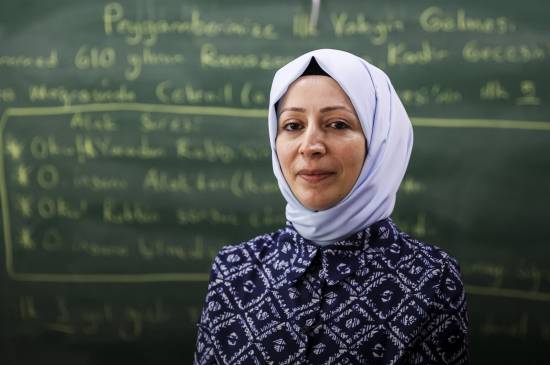Turkish teacher introduces religious concepts with origami art Featured
Religious culture and moral knowledge course teacher Kevser Çelebi encourages students to participate actively in her lessons with the project she developed with her colleagues that integrates origami art into lessons to make abstract concepts more concrete.
Çelebi, who has been teaching religious culture and ethics for about eight years, started to work at Kartal Soğanlık Teacher Salih Nafiz Tüzün Primary School in 2015.
With her colleagues, she initiated the "Origami with Tales, Stories and Anecdotes" project, which they started on the international platform "eTwinning" last October.
Çelebi told Anadolu Agency (AA) that while they were thinking about making lessons more fun and conveying national and spiritual values to children in a better way, they thought of origami, the Japanese art of folding paper.
Çelebi stated that they initially developed the project with seven teachers, and their number increased to 10 with the participation of Religious Culture and Moral Knowledge teachers from different cities.
"We determine a theme every month. We do an origami activity related to the narrative of the theme. The new generation of children is more active and more mobile; therefore we have considered the constructivist approach. Frankly, we wanted it to be student-centered so that children would not get bored in the lesson and actively participate. For example, we did a patience activity, after telling the story of the Prophets Job and Jonah, we made a fish origami," she said.
Çelebi stated that she aimed to teach the origami technique to students in this way.
Mentioning that she explained the steps to the students one by one: "Students progress with me at every step. I sometimes support them when they cannot progress. We use peer learning from time to time. With peer learning, the child says 'I can do it, I can succeed,' and also shows patience while helping their friend. And when they can't, they gain values such as tolerance," she added.
Çelebi stated that they saw the positive effects of this project on students, and they received very positive feedback from parents and students. Noting that the students come to the lesson quite motivated, she said, "When I say, 'We will have an origami activity next week,' the students come to the lesson with enthusiasm and excitement."
Expressing that they want more teachers to participate in the project they have developed, she added: "Our Religious Culture and Moral Knowledge course is an abstract field and children in the younger age want to see a little more concrete elements in the lesson. Learning becomes more permanent with concrete objects."
Within the scope of the project, they have marked important days and weeks for the origami activity.
"For Mawlid al-Nabi (marking the birth of the Prophet Muhammad), we had our students make a rose origami to teach about our Prophet Muhammad. When we talk about the love of our values, I had the students make a heart origami, a fox for love of animals and shaped ships on Oct. 29 that celebrate that day," she said.
Fourth-year student Ali Eren Başak said that he was very pleased with the teaching of the subjects he studied in the Religious Culture and Moral Knowledge course with origami. He found the lesson very enjoyable and said that he liked making things out of paper on the subjects. "It's really fun to learn our lessons like this," he added.
Fatma Ela Başçı, another student, stated that her teacher told stories while doing origami. Emphasizing that she both gains knowledge and increases her origami skills, "This method has brought me closer to the Religious Culture and Moral Knowledge course," she said./aa


